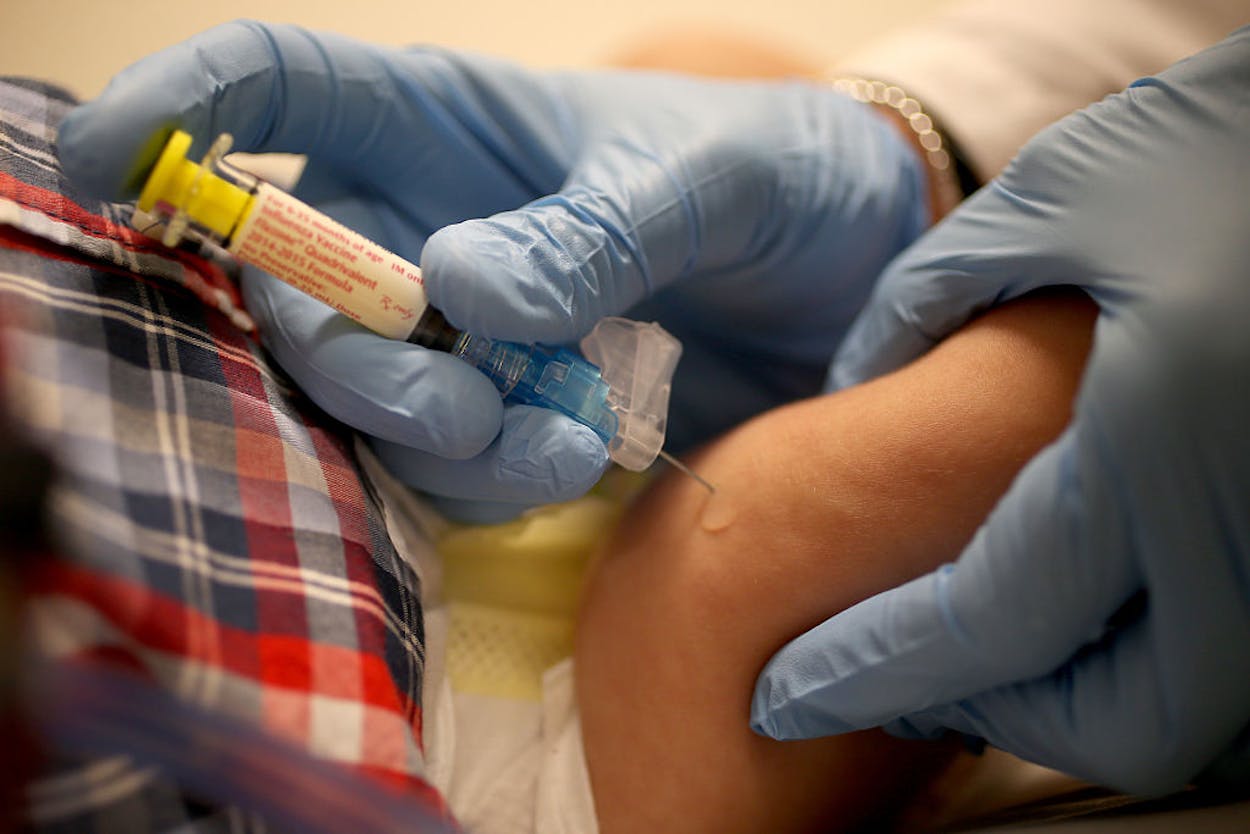Earlier this month, Dr. Peter J. Hotez, a pediatrician at Baylor College of Medicine and director of the Texas Children’s Hospital Center for Vaccine Development, detailed a disturbing prediction for 2017 in an op-ed for the New York Times: the country could be facing a measles outbreak, and the Lone Star State could among the earliest casualties. “Texas, where I live and work,” Hotez wrote, “may be the first state to once again experience serious measles outbreaks.”
Anti-vaxxers have increasingly opted out of vaccinating their children against measles, among other things. Their movement was galvanized by the 2016 release of Vaxxed, a documentary film directed by Austin resident and former doctor Andrew Wakefield, the same man who authored a since-retracted study that linked vaccines with autism. The film doubled down on his research, and drew so much criticism from the health community that it was pulled from the Tribeca Film Festival last year. Despite repeated assurances from credible health experts such as the Centers for Disease Control and the American Academy of Pediatrics that there is no link between vaccinations and autism, parents in Texas are opting out of getting their children vaccinated at an increasing rate. State data released in August showed that 45,000 non-medical exemptions were made last school year, an uptick from about 38,000 the year before, and up from just 3,000 in 2003, the first year a state law went into effect allowing parents to opt out of immunizations, according to the Houston Chronicle.
As we reported in September, that trajectory shows no signs of slowing, so Hotez’s prediction certainly bears some weight. In October 2016, Hotez published a journal article in the Public Library of Science that looked at vaccination and measles in Texas. Hotez wrote that “measles vaccination coverage in certain Texas counties is dangerously close to dropping below the 95% coverage rate necessary to ensure herd immunity and prevent measles outbreaks,” adding that “future measles outbreaks in Texas and possible measles deaths are not inevitable.”

The spread of measles—one of the most contagious and deadliest diseases—could be stopped by the Eighty-fifth Texas Legislature, where there are currently pending bills that take aim at correcting the anti-vaccination trend. In December, State Representative Donna Howard, a Democrat representing Austin, filed a bill that would require parents and students who choose not to be vaccinated to indicate that they will “opt-out,” as opposed to the current system in which people must “opt-in” in order to be vaccinated. The bill would also require education for parents and students before they choose to opt-out. A similar bill filed by Representative Sarah Davis, a Republican from Houston, would require parents to complete an online educational course to inform them about the dangers of opting out of vaccination.
But anti-vaxxers make up a strong political bloc, and they’ve successfully thwarted pro-vaccination efforts in the Lege before. In 2015, state Representative Jason Villalba of Dallas tried to pass a law that would have entirely removed the exemption protection for parents who claimed to have a “conscientious objection” to vaccinations. His proposal was promptly torn to pieces by a few thousand members of a Facebook group for Texas anti-vaxxers, which formed a PAC, Texans for Vaccine Choice, that ultimately killed Villalba’s bill. “These people, they literally said it to my face—they hate me,” Villalba told the Texas Tribune in April 2016, after his bill flopped. “This is a group that is very dedicated, very organized; this issue is very important to them.” Even after the bill failed, the PAC kept on Villalba. Jackie Schlegel, the PAC’s creator, told KUT in January that PAC members “knocked on nearly 10,000 doors for his challenger.” Villalba narrowly avoided defeat. Villalba told KUT that he supports Representative Davis’s bill, but it seems unlikely he’ll try to revive his own. “I’m not interested in a suicide mission on this issue,” Villalba told the Tribune last April.
Texas remains one of only seventeen states that allow parents to exempt their children from receiving vaccinations due to philosophical objections. None of the currently pending bills in the Lege would change that. Still, the Texans for Vaccine Choice PAC has already started to push back against the pro-vaccine billse. The anti-vax crowd is active on social media, and let Davis know that they were upset about her bill. In several exchanges with these folks on Twitter in late January, Davis shot down claims that vaccines cause autism by calling such assertions “alternative facts.”
https://twitter.com/SarahforHD134/status/826625747322155008
https://twitter.com/SarahforHD134/status/826627243552161793
https://twitter.com/SarahforHD134/status/826628280405082112
https://twitter.com/SarahforHD134/status/826634602768904193
Two days after Davis’s tweet storm, Texans for Vaccine Choice posted a blog on its website that condemned her for tweeting the word “F@ck”. “Concerned parents have been called many things in the course of this debate but having a state legislator use such vile language is a first,” Schlegel said in the statement. “Sarah Davis is a disappointment and an embarrassment to our state…We hope all organizations and individuals in this debate use a few less F words and a little more common sense.”
The PAC has also been a harsh critic of Hotez. In January, the PAC’s website published a blog post that began with the dictionary definition of the word “epicenter,” and proceeded to complain about being blamed for future measles outbreaks, calling Hotez a “media darling who lately sounds like a broken record.”
Hotez hasn’t backed down. “Sadly, the Texas anti-vaxxer movement has become conflated with fringe political elements to create a dangerous and toxic mix of pseudoscience and conspiracy theories,” Hotez wrote in the Public Library of Science journal. “This is now manifesting as a powerful yet misleading, propaganda-filled film documentary, together with an emboldened PAC designed to influence the Texas State Legislature towards anti-vaccine platforms. I worry that, as the most second-most populated state in the US, Texas is seen as a battleground for the anti-vaxxer movement.”






